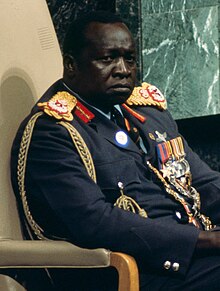History of Uganda
Following the migration and invasion of Luo peoples c. 15th century, Kitara would collapse, and from the ashes rose various Biito kingdoms such as Bunyoro alongside Buganda.
Idi Amin deposed Milton Obote to became ruler of Uganda in 1971, a position he would occupy for eight years until he was ousted in 1979 as a result of the Uganda-Tanzania War.
Although most of these developments were taking place southwest of modern Ugandan boundaries, iron was mined and smelted in many parts of the country not long afterward.
[6] British administrators like George Wilson CB attempted to address the serious scale of the public health crisis in the intervening years.
In succeeding years, supporters of a centralized state vied with those in favor of a loose federation and a strong role for tribally-based local kingdoms.
The Acholi and Langi ethnic groups in northern Uganda were particular objects of Amin's political persecution because they had supported Obote and made up a large part of the army.
[9] In 1978, the International Commission of Jurists — a statistic cited at the end of the 2006 movie The Last King of Scotland, which chronicled part of Amin's dictatorship.
After Amin's removal, the Uganda National Liberation Front formed an interim government with Yusuf Lule as president and Jeremiah Lucas Opira as the Secretary-General of the UNLF.
In their efforts to stamp out an insurgency led by Yoweri Museveni, they laid waste to a substantial section of the country, especially in the Luwero area north of Kampala.
[10] Obote was overthrown on 27 July 1985, when an army brigade, composed mostly of ethnic Acholi troops and commanded by Lt. Gen. Bazilio Olara-Okello, took Kampala and proclaimed a military government.
In the meantime, massive human rights violations continued as the Okello government carried out a brutal counter-insurgency in an attempt to destroy the NRA's support.
In 1996, Uganda was a key supporter of the overthrow of Zairean President Mobutu Sese Seko in the First Congo War in favor of rebel leader Laurent-Désiré Kabila.
[citation needed] Uganda continues to support rebel groups there such as the Movement for the Liberation of Congo and some factions of the Rally for Congolese Democracy.
[11] It was proposed on 13 October 2009 by Member of Parliament David Bahati and, had it been enacted, would have broadened the criminalization of homosexuality in Uganda; introduced the death penalty for people who have previous convictions, are HIV-positive, or engage in sexual acts with those under 18;[12] introduced extradition for those engaging in same-sex sexual relations outside Uganda; and, penalized individuals, companies, media organizations, or non-governmental organizations who supported LGBT rights.
On 13 September 2014, the Ugandan security and intelligence services, with the assistance of the United States, identified and foiled a major terrorist attack in Kampala.
They recovered suicide vests, improvised explosive devices, and small arms, and they arrested 19 people who were suspected to have had links to al-Shabaab.
[17][18] Ahead of the election, Museveni described the formation of an East African Federation uniting Uganda, Tanzania, Kenya, Rwanda, Burundi, and South Sudan as "the number one target that we should aim at.

